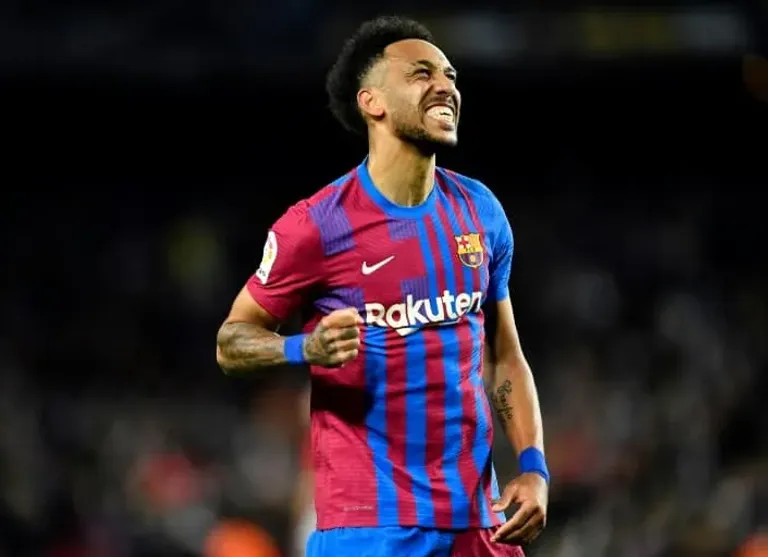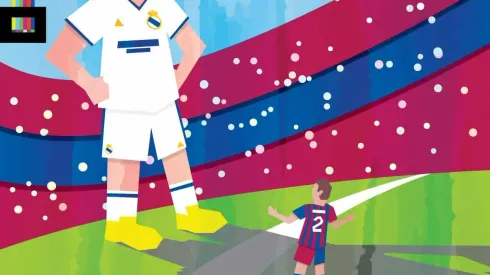
In the prior ages of the late 2010s, Barcelona developed a tendency to rely on its stars, particularly in major games like El Clásico.
This trend remained a somewhat feasible strategy due to the play of those like Lionel Messi, Neymar and Luis Suarez. However, the multitude of financial issues forced one of Spain’s most historic clubs to face the music.
Those three players are gone. Ernesto Valverde, Quique Setien and Ronald Koeman, scapegoats of the Barcelona board, forced out of the club. Joan Laporta reassumed the presidency of the Catalan side. Essentially, the Barcelona we see now shares just a handful of similarities with those sides of old.
Gerard Pique, Sergio Busquets, Jordi Alba and Marc-André ter Stegen remained with the side since its UEFA Champions League triumph seven years ago. Also, Dani Alves returned from travels across the world playing at the tender age of 38.
The modern Barcelona side does not depend on these players. Rather, there is a core of young talent that looks set to blossom into stars.
A midfield triumvirate of Pedri, Frenkie de Jong and Gavi already boss games in LaLiga.
The attacking options may not be as young as those in the midfield, but it is certainly a new look. Adama Traore, Pierre-Emerick Aubameyang, Ousmane Dembele and Ferran Torres are the main goal-scoring culprits.
At the head of it all is the manager. Xavi made a substitute appearance for Barcelona in that 2015 Champions League Final. It was his last appearance for the Blaugrana. He understands the power of wearing that storied shirt, which will soon have Spotify on the front.
Still, let’s not jump too far ahead. El Clásico may not have the stars of the prior generation, but the game’s next stars look set for a crucial battle on Sunday.
Recommended Viewing Option
 |
Price: $6.99 / monthIncludes: LaLiga, Bundesliga, FA Cup and more |
Try It Now! |
Turning the page
With Sunday’s Clásico being the second meeting between the Spanish giants this season, this is not the beginning of a new era. In fact, most of the players slated to start against Real Madrid played last season or the year prior. Moreover, the two sides met in Saudi Arabia in January during the semi-final of the Supercopa de España.
Federico Valverde’s 98th-minute winner for Los Blancos continues a trend of dominance for the side from the Capital. Over the last five meetings in all competitions, Real Madrid has five wins. Carlo Ancelotti’s squad has two of those wins in the last six months. To go along with the Supercopa de España win, Real Madrid knocked off the Catalans at Camp Nou in October, 2-1.
In Xavi’s time as a player for the Blaugrana, he played in 42 games against the club’s biggest rival. Not only was the rivalry more balanced in those times, but it actually leaned somewhat in favor of Barcelona. Barcelona managed 17 wins, 12 draws and 13 defeats against Real. Xavi contributed five goals and eight assists in that time.
As stated previously, those glory years of Iniesta and Xavi feeding Messi goals are well in the past. This will be the Spaniard’s second time managing in a Clásico and the first one in Spain.
He has Barcelona playing some of their best soccer since Luis Enrique. While it is still early, ‘Xavi ball’ brought a renewed sense of joy to a dull, and sometimes empty Camp Nou.
What Xavi has is a project headlined by the liked of Pedri, Gavi, Frenkie de Jong and Ansu Fati, even if the latter remains plagued by injuries. This contest against Real Madrid serves as a trendsetter for the future, with some immediate implications as well.
Barcelona’s new age
You may be asking yourself how this weekend’s El Clásico differs from the one back in October. After all, I called it the start of a new era of El Clásico.
However, that Barcelona side pales in comparison to the one Xavi trots out each week now. Granted, the players are the same. Ansu Fati remains injured and the future of Ousmane Dembele is still uncertain. Albeit, the Frenchman’s performances are something Xavi will want to keep.
Still, Sunday’s fixture between the two Spanish giants is the chance for a statement game from Barcelona. It’s one thing to score four goals and beat clubs like Valencia, Athletic Club and Atletico Madrid. Doing that puts the club in contention for the top four, something that looked bleak in the reverse fixture of El Clásico.
It is another thing to be on the same level as Real Madrid. Not only is Real set to claim record-35th Spanish top flight crown, but Los Blancos make mince meat of the Spanish competition. They are 10 points clear at the top. Coincidentally, Real only dropped points in eight games this season. Interestingly, Sevilla and Real both have just two losses. The difference is that Sevilla has five more draws than the team from the capital.
Barcelona is just on the outside of that title race, if it can be called that. But, on the flip side, Barcelona is now in the top-four, looking set for Champions League qualification. The current crop of players with young ages make a difference week in and week out.
It feels strange to even write that, as it should be no less than a guarantee that Barcelona finishes as one of the four best teams in Spain in a given year. That speaks to the situation the Barcelona board put themselves in.

Enjoyment, then results
Over the past several years, smiles were seldom around Camp Nou. They would come in doses, like when Barcelona won the Copa del Rey last season or LaLiga in 2018/19. Or, when Barcelona dismantled Liverpool in the first leg of the 2018/19 Champions League semifinal. Lionel Messi was at his brilliant best. That was the worst-case scenario for Barcelona.
A lack of a supporting cast and a dejected feel from the Argentine set the stage for frustration as the new decade came along.
Xavi’s arrival seems to have changed all that. From the onset, Barcelona’s social media pages showed the players laughing at training, looking more like teammates than coworkers.
Debates continue about the effectiveness of this happiness at training. What cannot be debated are the results. After a rocky start including elimination from the Champions League and just three wins in his first eight official games, ‘Xavi ball’ is in full swing.
January brought a little more frustration. Athletic Club and Real Madrid knocked the Catalans out of the two most likely options for major trophies, the Copa del Rey and the Supercopa de España. However, those are Barcelona’s only two losses in the calendar year. Coupled with nine wins and four draws, Barcelona reasserted itself as a good, maybe not great, team.
But look beyond the scoreline of the games, and you see Barcelona plays with a style, somewhat emblematic of the tiki-taka style that Xavi tortured the opposition with during his trophy-laden career as a player.
Calling this a new age for Barcelona is ironic. Pedri’ and Frenkie de Jong’s midfield creativity and the fear Adama Traore or Ousmane Dembele impose on the flanks looks like Barcelona went back in time.
The next step
That is why Sunday’s El Clásico is paramount for Barcelona. Looking across the expected lineup based on recent outings, and many of these players have either not beaten Real Madrid, or even played them at all.
Pedri and Frenkie, both frequent names throughout this piece and on Barcelona’s team sheet, have experience playing Real Madrid. However, both players only arrived ahead of the 2019/20 season. Frustration is certainly mounting for them to clear the white hurdle.
Real Madrid is the gold standard in Spain right now. A good mix of experience headlined by Toni Kroos, Luka Modric and a blazing-hot Karim Benzema combines well with the likes of Vinicius Junior and a (26-year-old) Marco Asensio.
The statement from October over the fact that this is a new generation of El Clásico remains the same. Yet, Barcelona must move on into a new age of its own. The flair seems to be coming back. Now Xavi must show the young players what it takes to unseat the best side in Spain.














